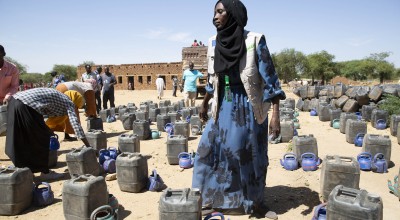
Read our 2024 annual report

Knowledge Hub
Tens of thousands of displaced families are struggling to pick up the pieces of their shattered lives after waves of violence swept through Sudan's West Darfur state. We met one young mother who made the difficult decision to return home.
Nedal Abdalbanat leads us through a dusty maze of laneways towards what remains of her home. Destruction and decay are all around and it’s eerily silent. This is Ardamata, a once-thriving neighbourhood on the outskirts of West Darfur’s main city, El Geneina. Two years ago, it was home to over 80,000 people. Today, it’s virtually deserted.
Ardamata came into existence as a displacement camp for those fleeing persecution in the violence that swept through West Darfur in the early years of this century. Over the past two decades it morphed from a temporary refuge into something more akin to a low-rise suburb of brick and tin homes, with shops, markets, schools, a health centre and all the other facilities one would expect in a community this size.

Nedal was born here, into a life of displacement, her family among those who sought refuge in what was once a safe haven managed by the government and the United Nations. It’s the only home she has ever known.
In April 2023, when conflict erupted in the Sudanese capital Khartoum and quickly spread across the country, the people of Ardamata feared renewed persecution. Some fled, but many stayed, including Nedal and her family. Then, on November 1st, armed groups entered the area and began systematically attacking and evicting families.
For Nedal, just 18 years old at the time, it was a terrifying experience. “A group of people entered our home. I asked them to leave, but they refused. I was very scared, and I decided we had to get away.” Taking her newborn son, Abdul Kareem, she embarked on a perilous journey that ultimately led to a temporary refugee camp in Adré, just across the border in Chad. Today, almost the entire population of Ardamata live in that camp, in makeshift shelters with few facilities.
Exile and return
“I stayed there for five months, but it was almost impossible to survive,” Nedal says. “I had no money and no way of earning income. We had very little to eat and my son was not well, so I decided to come back. It was a difficult decision, but I felt we had no choice.”
Today, Nedal’s situation remains precarious. With help from neighbours and relatives, she has carried out rough repairs on the family home, although much of it was destroyed. “There were dead bodies here when we came back,” she recalls. Much of Ardamata is in ruins, with most of the facilities abandoned or destroyed. A few hundred yards from Nedal’s home, the local school lies empty, unused, and overgrown. Its gates lie mangled in the dirt, classrooms bereft of furniture and scorched by fire.

Food is scarce and Abdul Kareem, now a one-year-old, has become severely malnourished. Nedal brought him to the nearby health centre, which was ransacked and looted during the attacks, but has since been repaired and reopened by Concern.
The boy was screened by a nutrition team and is now on a course of emergency therapeutic treatment, which should last between six and eight weeks. Nedal says his condition is improving every day.
At the health centre, business is brisk, despite the dramatic fall in Ardamata’s population. Concern’s Dr. Rimaz Maccido says that the nutrition team at this facility is currently treating over 100 children for acute malnutrition, 27 of them severe. Concern is also supporting the centre with staff, medicines, and vaccines, as much of the health system in West Darfur is in disarray because of the conflict.

Nedal says she feels safer now but worries about the future. Her main concern is for her young son, who faces a difficult life ahead in a conflict-scarred community beset by many challenges, both social and economic.
Concern's response in Sudan
Concern has worked in Sudan since 1985 and currently has operations in West and Central Darfur and West and South Kordofan, supporting conflict-affected communities with cash payments, health and nutrition services, and essential humanitarian supplies.





